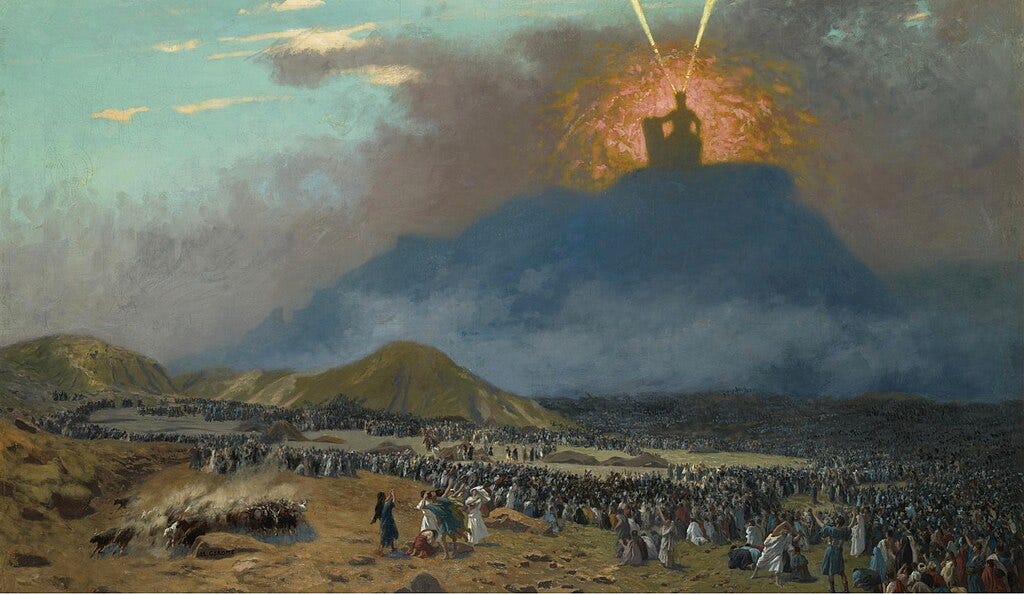How We Take the Lord’s Name in Vain Without Saying a Word
In each moment we face a choice: vanity or virtue?
I should preface this with the following: I am not a theologian, I did not attend seminary, I have no letters after my name that claim any sort of knowledge or authority. What follows comes solely from intuition received through daily meditation where one senses unity with The Divine. For me, in my life, it is revealed Truth. Many times in meditation, when doubts arise about these writings, the silent voice within loudly commands me to keep writing and to continue sharing it. Take what follows or leave it as you see fit.

Thou shalt not take the Lord’s name in vain.
One of the ten commandments reads, “Thou shalt not take the Lord’s name in vain.”
What does this even mean? Surely it doesn’t mean not to say certain curse words, as I was taught though, admittedly, some cursing might violate the spirit of the commandment. And of course there is the idea that the commandment refers to swearing an oath upon the Lord’s name — an idea which has merit — so, perhaps what follows is simply another layer of meaning that has relevance to me, personally.
Whatever the meaning, out of the entire Bible, this phrase, which is in the top ten commandments, must mean something important and deep for everyone’s life beyond banning a few “bad” words.
So let’s dig into what the Bible could possibly mean by the “Lord’s Name” and “in vain.”
“The Lord’s name” must mean something deeper than the human word “God” or “YHWH” or “Jehovah” or “Allah” or whatever other words people have invented to refer to the unreferrable.
God is beyond spacetime, beyond the physical universe (though He is everything in it also), and beyond language, so his “name” can’t be a man-made name in a man-made language. His “name” is something more like his identity/essence. Any “language” of God would be like a “sound”, a vibration, such as quantum vibrations: a quantum song. In the quantum realm, everything in the physical universe really does arise by vibrations of “nothing” — quantum fields. At the smallest levels, “matter” doesn’t exist — everything is energy vibrating.
I find the idea of a “quantum song” intriguing and I’m reminded that C.W. Lewis, a well-known Christian apologist, chose, in The Chronicles of Narnia to have Aslan sing Narnia into existence:
In the darkness something was happening at last. A voice had begun to sing. It was very far away and Digory found it hard to decide from what direction it was coming. Sometimes it seemed to come from all directions at once…
…the blackness overhead, all at once, was blazing with stars. They didn’t come out gently one by one, as they do on a summer evening. One moment there had been nothing but darkness; next moment a thousand, thousand points of light leaped out—single stars, constellations, and planets, brighter and bigger than any in our world…it was the first voice, the deep one, which had made them appear and made them sing.
— C.S. Lewis, The Magician’s Nephew

We are told in the Gospel of John that the WORD was God and that the Word became flesh. The greek word used in John is logos, and, indeed, is usually translated as WORD, but it could also be translated as thought, speech, utterance, logic or, with a bit of poetic imagination, vibration or song. This is why I sometimes refer to the logos, the Christ force, as “the creative song of the universe.”
While the verse in John was referring, obviously, to Christ, I believe that NAME and WORD are used somewhat interchangeably to refer to the vibration of God that gives rise to all things: the divine “name” or vibration that manifests as power and life.
This ever-changing, ever-evolving vibrationary power from the “foundations of the world”, the “Name of God”, the “Word” is what powers life. It is the holy spirit and the Christ/logos. It is the breath of life, that turns a handful of earth elements into a living human – you.
To me, this vibration is the Lord’s NAME. When we are in harmony with the song, we are “IN HIS NAME” — we become part of the symphony. But, when we force our own egocentric will upon reality, we play a discordant melody and, like the Discord of Melkor in Tolkien’s Middle Earth stories, we fall out of His Name and create all manner of trouble for ourselves and others.

…the discord of Melkor rose in uproar and contended with it, and again there was a war of sound more violent than before, until many of the Ainur were dismayed and sang no longer…
— J.R.R. Tolkien — The Silmarillion
We humans use names as mere identifiers, but, in the Bible, names often seem to be used not as simple identifiers, where one name is just as good as another, but as pointers, as icons, that point to the true essence, purpose, power and reality of the one named. The Lord’s NAME thus, is an icon in which we become enveloped to experience the purpose, essence, and power of the true reality behind all illusions — The Kingdom. To be In His Name is to be in The Kingdom.
To take the Lord’s NAME in vain, then, to me, seems like it would mean to deny this powerful icon and turn away from the true Kingdom that lurks behind all; it would be to take the miraculous life power that quickens our body for a few decades in the service of our own vanity, rather than using our time to serve God’s actual purpose for us.
Thus, the Lord’s NAME has a dual meaning in the commandment — it encompasses both His absolute vibratory essence and his essence as it manifests in our lives; for we are part of Him.
Consider that in biblical stories, God often changed the name of people to symbolically align them with their essence and their mission.
Each person’s original name was merely their human identifier, but their new name, given by the Lord is their true Kingdom identity, it is their true purpose, it is their true name, it is the Lord’s Name for them. It is not their historical name but the name of the person as an icon that pierces the veil of illusion and reveals the true nature of reality.
Peter, not Simon, is the icon of the spiritual rock upon which Christendom was built.
Israel, not Jacob, is the icon that birthed the nation of God’s chosen people.
Paul, not Saul, was the icon that brought the Gospel to the Gentiles.
Their names and stories are iconic.1
For Peter to have taken his iconic name in the service of his own ego, his vanity, would have been to take the Lords Name for him in vain.
In each moment, we face a choice; we must answer the following question: vanity or virtue?
The ego tempts us down the highway of vanity where names are mere identifiers and, if it feels good, do it.
But the voice of silence calls to us in each moment, it whispers our true purpose, our true name, the iconic name the Lord has prepared for us, which, if we step into it, will dispel the illusion and grace us with a glimpse the truth of the Kingdom.
There is a voice that doesn’t use words. Listen.
— Rumi
Virtue or vanity? Icon or illusion? Heavenly or worldly? The Lord’s Name or our worldly names? This is the crux of freewill. In fact, this points to the crux, the crucifix. This crux of freewill is the choice we face: will we take up our cross and allow our false egocentric self’s destructive will to be crucified? We will if we wish to truly rest blissfully in the grace infused name of God where His will and our will become the same thing through Love.
When we choose our true name, virtue flows through healing, beauty, love, truth and goodness. When we choose the ego, vanity consumes all it can, creating anxiety, ugliness, hate, falsehood, and evil.
Your True Name, you see, is a mantel, a title. Do you not know that you are a child of God? You are noble and, to step into your nobility, you must take up the responsibilities of your mantel. Your True Name is your noble Kingdom; your inheritance. It is, as Stephen Pressfield says in The War of Art, your territory:
We humans have territories too. Ours are psychological. Stevie Wonder’s territory is the piano. Arnold Schwarzenegger’s is the gym…
When I sit down to write, I’m on mine….A territory provides sustenance…A territory can only be claimed alone…A territory can only be claimed by work…A territory returns exactly what you put in…
When the artist works territorially, she reveres heaven…The sustenance they get comes from the act itself, not from the impression it makes on others…The work comes from heaven anyway. Why not give it back?
— Stephen Pressfield, The War of Art
Siddhartha Gautama was his given name, but his title was: The Buddha.
Many believe Magdalene was a title, an icon, her true name that means The Tower. Let us not forget that while the boys scattered, she was there at The Cross, she was there as He was entombed, and she was the first to see Him risen. She became an apostle to the apostles; a Tower of strength, love and devotion, even in the absolute worst of circumstances; even when the others had lost all hope.
And, of course, the ultimate example: Jesus was the identifier of the man, but His True Name, His mantel, His title, His iconic name, the Lord’s Name for Him: The Christ. He became the living embodiment of the intelligent Christ force of the universe.
You too have a true name, a calling, a Lord’s name.
God’s presence in this universe seems to be two-fold.
First, we have the ever-changing vibratory WORD or “NAME of God” in the holy spirit, impermanence, life-force, nature, raw power.
And second, we have the guiding awareness, the reflection of the Father, the creative, evolutionary song, the only “begotten son” in the Christ Force of the universe.
Together, these two forces bring you life and abundance. We know, from scripture, that the Lord came so that you could have life and have it more abundantly.
These melodies of guidance attempt to steer you to your real identity and essence; your true name – the Lord’s name for you. Stepping into that name is where life and abundance are found. Ignoring these two forces and their calling turns you away from the Lord’s Name and toward the discord of your own ego: Your own vanity.
If you are called to be an artist, and you turn away from that to serve your vanity in some other way, you are taking the “Lord’s name” in service of your vanity. You are taking the Lord’s name in vain.
So let’s think through how this understanding of the commandment might apply to our creative lives by expanding it with the insights developed in the preceding discussion:
Thou shalt not take the Lord’s name in vain.
Thou shalt not take the Lord’s vibratory power of life and the guiding Christ intelligence in vain.
Thou shalt not take the vibratory power of ever-changing life and the guiding, creative, transforming intelligence in your consciousness in service of your own egoistic vanity.
Thou shalt not take the vibratory power of ever-changing life and the guiding, creative, transforming intelligence in your consciousness in service of your own egoistic vanity. Instead, listen closely to the calling of your heart when kindled by beauty, truth and wonder and find the courage to follow that calling where you will find synchronicities help you along your true path, where joy, abundance, fulfillment, and God await you; for when you are properly in the Lord’s vibratory power, IN his Name, you find your true name. This brings deeper meaning to the phrase in the NAME of the Lord.
“And even though it all went wrong / I'll stand before the Lord of Song / With nothing on my tongue but Hallelujah.”
— Leonard Cohen, Hallelujah
If you would like to support my writing, please take out a premium subscription (just $6 per month).
No AI Zone: Everything written in this post (and all my posts) is written 100% by me, Clint “Clintavo” Watson, a flesh and blood human seeking to grow my soul and come home my truest self; for that is the essence of creativity. I do not use AI to assist me with writing — that would deny me the very growth of my world through writing that I seek.
I only rarely use AI images with my (non-AI) writing. On the rare occasions I do use an AI image (usually fiction), I also feature at least one artwork by a human artist with image credits and links to their work or, if I can’t find a suitable image, I donate a free month of website service to one of our artist customers at my SaaS company, FASO Artist Websites.
Poetic expression, spiritual ideas, and musings upon beauty, truth and goodness should be free to spread far and wide. Hence, I have not paywalled the work on Clinsights. However, if you’re able to become a paid subscriber, I’d be eternally grateful. It would help, encourage and enable me to continue exploring these topics and allow me to keep it accessible for a world that is in desperate need of beauty, truth, goodness and love. — Creatively, Clintavo.

Many thanks to Eugene Terekhin whose recent piece, Why We Remember What We Never Saw dropped right as I was struggling with this piece. His ideas around the iconic myths vs. the historical persons of King Arthur, Moses and Christ greatly helped me refine my thinking just as I was struggling to verbalize some of these thoughts.


You have opened my eyes to a new way of seeing and understanding. Thank you!
Well said, Clint.
Along the same lines, the work of Carmen Joy Imes, “Bearing God’s Name” is an amazing book that opened my eyes to how that first commandment means so much more than a curse word or two.
Also, I’ve always loved how the Hebrew word often translated as hover in Genesis 1:2, as the Spirit of God was hovering over the waters at the very beginning of the creation story, actually means to vibrate.
You’ve tied these thoughts together quite well.
And…your website hosting has helped me tremendously…Thanks!